Julie Webb-Pullman: Sore Winners the Losers
Sore Winners the Losers
by Julie Webb-Pullman
Judging by their behaviour since the regional and municipal elections on 23 November, the only constitution the Venezuelan opposition seems to understand is that of itself – ignorance and thuggery. Whether their ignorance stems from their inability to comprehend the most fundamental tenet of democracy - majority rule following open, free and fair elections - or their inability to count, or both, the fact remains that the opposition was again soundly defeated for the 12th time since Chavez was elected in 1998. In the (probably vain) hope that repetition assists learning, and in order to help these less fortunate members of the human race attain a minimal level of numeracy and comprehension, let's take another look at the election results.
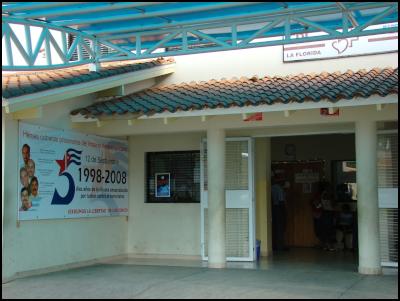
Click to enlarge
Integrated Diagnostic Centres such as this were attacked
Pro-Chavez PSUV candidates won 77% of governorships (17 of 22), 81% of mayoral offices, and 77% of all contests, in the highest recorded turn-out ever for such elections, 65.45%. Compared to last December's referendum vote which Chavez lost, the pro-Chavez vote in these elections increased by over one million to 5,419,064, while the opposition vote fell from 4,380,000 to 4,260,541.
130 international observers attended the elections, judging the process to have been open, free, fair and efficient, and according to Organisation of American States (OAS) Secretary-General José Miguel Insulza, "peaceful and exemplary."
So, PSUV won overall and even increased their total number of votes while the opposition gained additional governorships and mayoralties, in an election universally agreed to have been fair and open.
However, within days of the election, members of facetiously-named opposition party "Justice First" flexed their muscle in states and municipalities won by opposition candidates, apparently determined to prove that they can not only be sore losers, but also sore winners.
First
intimidation...
In La Urbina and Mariche they kicked
people out of the premises of the Mission Robinson (primary)
and Mission Ribas (secondary) education programs and tried
to confiscate the keys to the buildings, and in the state of
Táchira co-ordinators were ordered to vacate all state
schools, with the missions now suspended until they can find
alternative accommodation. In Miranda functionaries of the
new Mayor attempted to evict Communal Councils, giving them
days to vacate their premises. They also attacked Integrated
Diagnostic Centres, secondary health facilities of the
national Barrio Adentro health programme which are in fact
national government facilities, and intimidated doctors who
work for Barrio Adentro, claiming they had the power to
remove them from their lodgings. Locals intervened and
prevented their eviction. María Malpica, PSUV Mayor-elect
in Colon municipality in Zulia reported that four buildings
were looted in mayhem instigated by the opposition aimed at
preventing her from assuming power, with eight people
injured in the clashes. William Castillo, Vice-President of
Venezuelan Television, reported attempted sabotage of
alternative channel Avila TV.
...then
assassination
Within a week mere thuggery had
escalated into cold-blooded murder. On Friday 28 November
three trade union leaders in Aragua state - Richard
Gallardo, Carlos Requena and Luis Hernandez – were
assassinated. The following Tuesday Simon Caldera, President
of the pro-Chavez Bolivarian Construction and Industry
Union, was shot in the head while driving on the highway,
and two other trade unionists were also injured in the
attack. An arrest has been made in relation to the first
three deaths, which head of Venezuela's Interior and Justice
Ministry, Tarek El Aissami, described as "hired homicide."
No prizes for guessing who is paying the sniper...and
playing the hoon.
The Colombian
Connection
The Venezuelan opposition won the states
of Zulia and Táchira, which together form an axis along
Venezuela's border with Colombia.
Zulia is economically important, being one of the states with the highest oil production, while Táchira is utilized as an entry and transit point for paramilitaries, narco-traffickers, smugglers, and the currency black market. In a recent interview with venezuelanalysis.com, Gonzalo Gómez, PSUV leader, trade unionist, and co-founder of the revolutionary website Aporrea.org, said that despite being underground, it is still one of the most important sources of funding for the Venezuelan oligarchy.
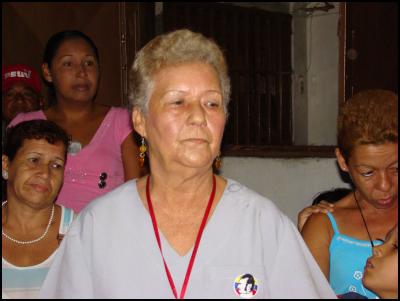
Click to enlarge
Lawyer in the making - this 72 year old woman has completed her primary and secondary education through Missions Robinson and Ribas
"Although they appear to live off banks, industries, businesses, and legal transactions, the large owners of capital always have under-the-table illicit business dealings, mafias, and networks of drug trafficking and money laundering," he claimed. The facts appear to support his view.
The three murdered trade unionists Richard Gallardo, Carlos Requena and Luis Hernandez were advocating on behalf of workers at the Colombian-owned dairy plant Alpina. At the swearing in of newly-elected PSUV governor of Aragua Rafael Isea on December 02, President Hugo Chávez made thinly-veiled references to Colombia, and made it clear that the importation of Colombian trade practices to his country are not welcome. He threatened to nationalise any companies violating workers' rights, describing the deaths of these three trade unionists as political assassinations. "I have ordered an investigation into the actions of this company because there are companies in other parts of the world which use contract killings against workers' and peasant leaders, and now they want to bring these practices here. We cannot allow this in Venezuela."
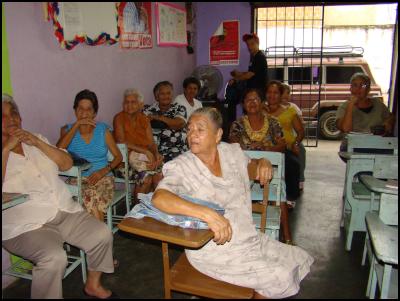
Click to enlarge
Mission Ribas class in Valencia, Carabobo - previously-illiterate students like these are being thrown out of their classrooms
Colombian
Consul exits
It is not just Venezuelan workers and
trade unionists that are at risk. The previous day, Colombia
agreed to withdraw their consul Carlos Fajardo based in
Maracaibo, Zulia state, after a conversation between Fajardo
and José Obdulio Gaviria was aired on Venezuelan state
television programme "The Mandinga Papers." Gaviria,
current adviser to Colombian President Alvaro Uribe and
cousin of deceased – and notorious - narco-trafficker
Pablo Escobar Gaviria, is also widely believed to have been
behind the demobilisation of paramilitaries and their
subsequent reorganisation as "The Black Eagles," who
along with paramilitary group "United Self Defense of
Colombia" are based in the Uribia and Maicao regions of
the Colombian state of Guajira, from where they make
numerous incursions across the Venezuelan border committing
crimes and massacres, including the forced displacement of
the indigenous Wayuu community.
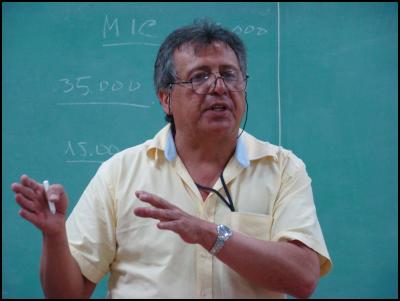
Click to enlarge
Prof Marcelo Alfonzo reviews social progress since Chavez came to power
In the conversation aired on television, Fajardo and Gaviria discuss the recent regional election results. "It's turned out very well...the two people are very good friends and I think that for our work here, it should be fantastic... " said Fajardo, adding that Pablo Perez, the new opposition governor of Zulia state, is "a very special friend here of ours."
"We have potential, I already spoke to them this morning and we're going to meet to look at taking some action at the level of government, because I'm thinking about what we are doing there. I need your go ahead, because when you tell me 'start', I'll get going," Fajardo continued. He indicated that he would meet Gaviria in the first week of December and said, "This is very good news, if things from there crystallize." The objective was said to be "to infiltrate with thugs and paramilitaries."
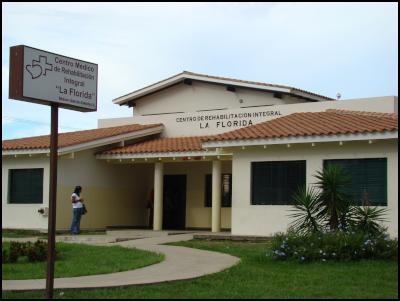
Click to enlarge
Rehabilitation Centre providing free treatment to previously unserved populations
The same programme also revealed an email exchange between Venezuelan opposition politician Diego Arria and the new opposition Mayor of Greater Caracas Antonio Ledezma, in which they discussed a meeting in the capital of Táchira, San Cristobal, with various newly-elected opposition members as well as the mayor of the Colombian border town Cucuta, reputed to be one of the "most important bosses of...The Black Eagles."
Following the programme, President Chavez said ""Either they take [the consul] out or he'll be kicked out," and Fajardo was subsequently officially accused of involving himself in the internal affairs of the country, in breach of international law.
Colombia then withdrew Fajardo, who did not deny any of the accusations, but had the temerity to denounce the disrespect shown to his telephones, claiming his privacy had been invaded.
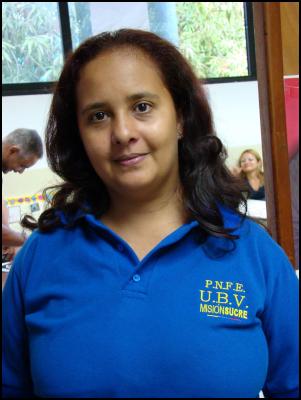
Click to enlarge
Teacher on the first day of Mission Sucre programme at the Bolivarian University in Carabobo State.
Sorry Senor Fajardo, but my sympathy is all used up on several million Venezuelans with a far greater claim than yours, from the four dead trade unionists, to the displaced members of the Wayuu community and those Wayuu still living under threat and extortion, to the residents of the state of Táchira suffering constant invasion, intimidation and death at the hands of your gangs of thugs, to the millions of pro-Chavez Venezuelans trying to democratically build a fair and just society in which all citizens can participate, but who instead are being subjected to intimidatory and terrorist activities against the civil population, following the clear and unequivocal results of a universally-acknowledged open, free and fair election.
President Chavez and the PSUV understand that democracy functions best in societies in which all of the population is well-informed, and where civic and social institutions and processes, such as elections and their results, are respected. They also understand that literacy and numeracy are fundamental to accessing and comprehending information. The last ten years have seen enormous advances in all of these areas, and more.
The Venezuelan opposition would do better to throw themselves into Mission Robinson and Mission Ribas rather than throwing them out – maybe then they'd have some chance of understanding not only the basics of democracy but also the Venezuelan Constitution, as well as their own. With another referendum imminent, perhaps they might even realise why increasing numbers of Venezuelans are making an informed choice and voting - but not for them.


 Eugene Doyle: Has WWIII Started?
Eugene Doyle: Has WWIII Started? Binoy Kampmark: Fencing The Ocean - Australia’s Social Media Safety Bill
Binoy Kampmark: Fencing The Ocean - Australia’s Social Media Safety Bill Binoy Kampmark: Trump, AUKUS And Australia’s Dim Servitors
Binoy Kampmark: Trump, AUKUS And Australia’s Dim Servitors Peter Dunne: Dunne's Weekly - The Wrong Answer To A Question That Does Not Exist
Peter Dunne: Dunne's Weekly - The Wrong Answer To A Question That Does Not Exist Martin LeFevre - Meditations: Perception, Conception And Beauty
Martin LeFevre - Meditations: Perception, Conception And Beauty Alastair Thompson: On The Publication Of The First NCQG Text 'New Collective Quantified Goal On Climate Finance'
Alastair Thompson: On The Publication Of The First NCQG Text 'New Collective Quantified Goal On Climate Finance'